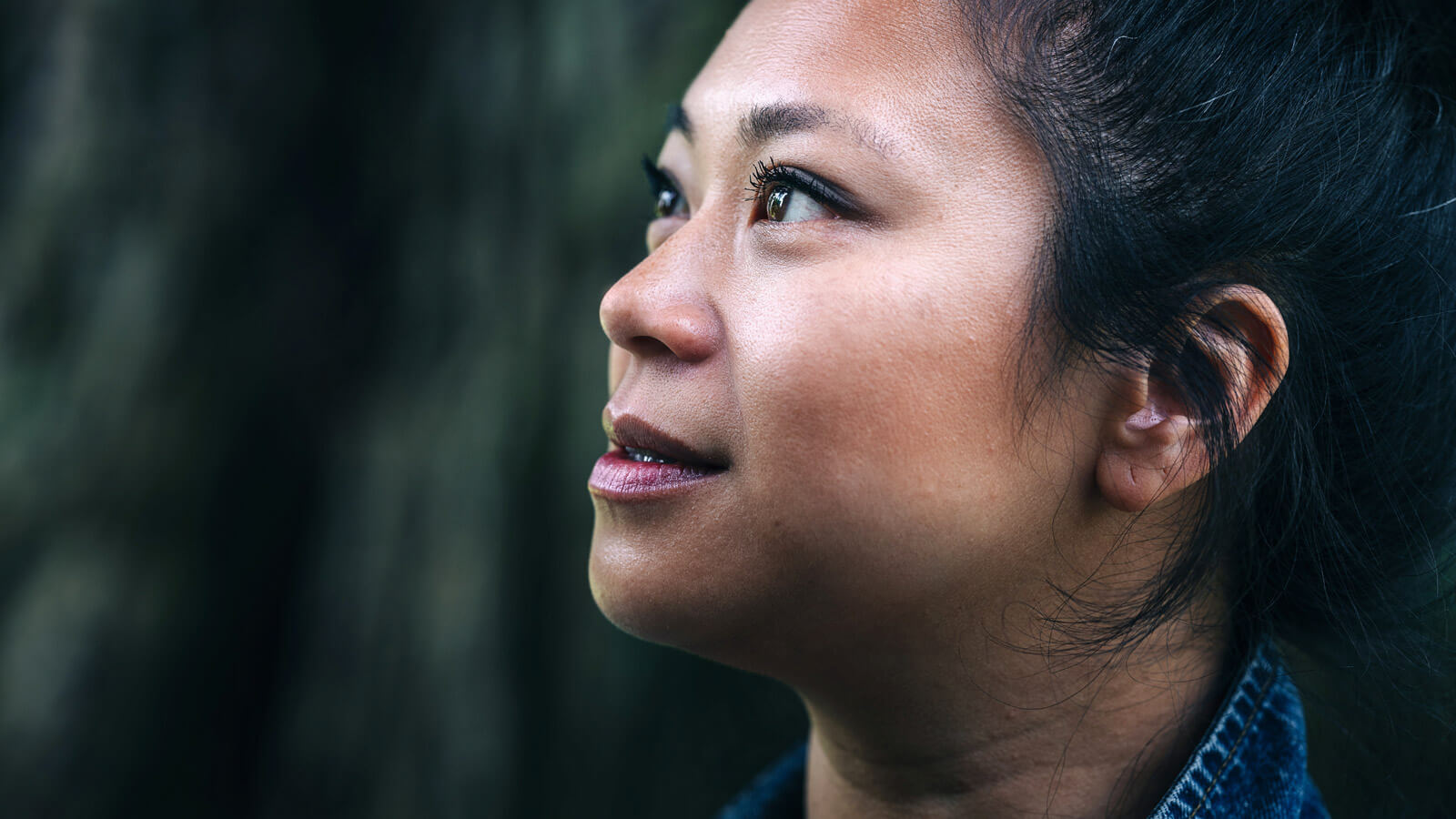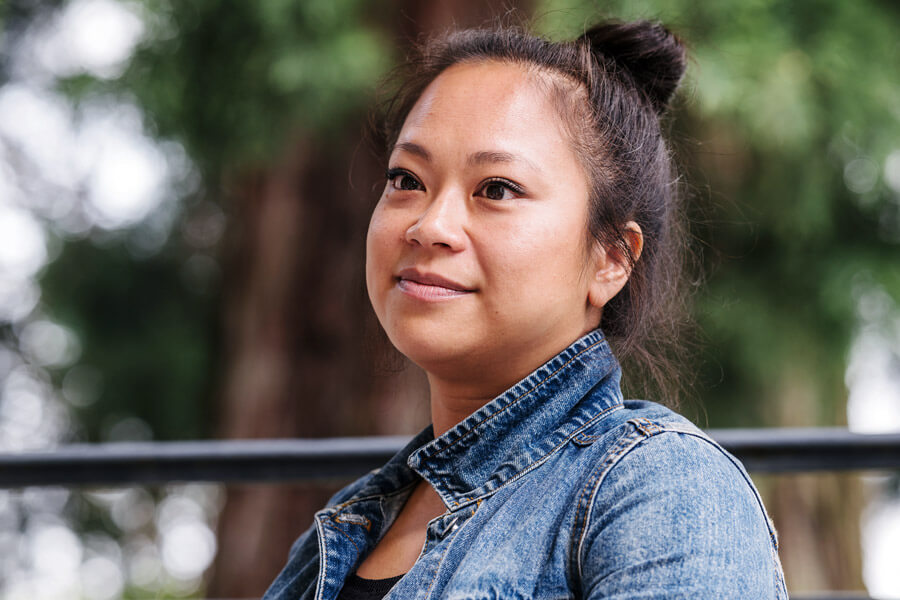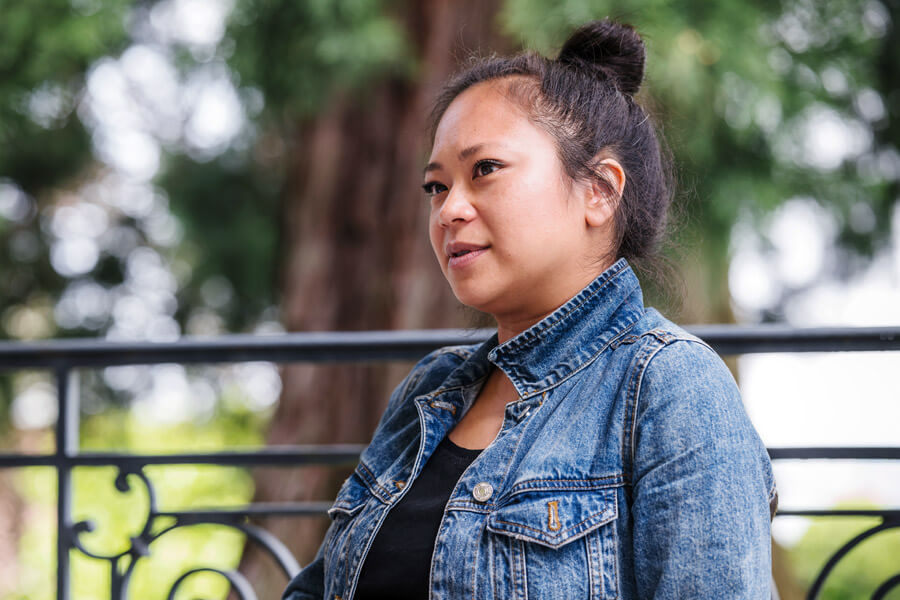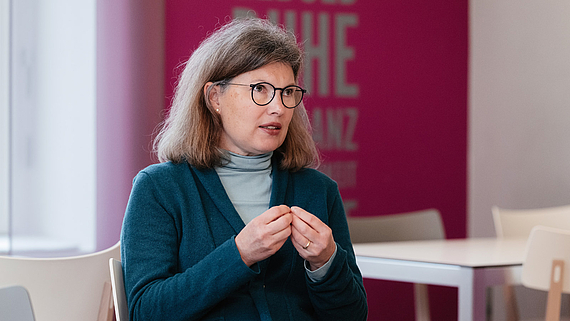A patient tells her story
“My stay in the clinic remains a source of strength for me today.”
For people experiencing a life crisis, a stay in a psychiatric clinicl still carries with it many fears and reservations. The decision-making process is fraught with questions, uncertainties and doubts. A former patient at Klinik Meissenberg recounts her experience of staying at the clinic.

V. does not do things by halves: She is studying environmental sciences, writing her Master’s thesis, successfully completing her degree, is the mother of an 18-month-old son, works 30%, is moving into a house with her partner and wants to renovate it herself right away. That was three years ago. What followed was a total collapse: First a shoulder injury, then no more sports as a means of relaxing, followed by insomnia to the point of complete exhaustion and pain all over the body, and finally admission to Klinik Meissenberg. V. laughs somewhat in disbelief when she tries to describe that time in a few words today.
“My parents always had very high expectations of me. I have tried to live up to these expectations my whole life. Work, child, studies, house, relationship: No problem at all, I thought to myself at the time. I ignored the warning signs for a very long time: The insomnia, not wanting to cook any more, the increasing feeling of being overwhelmed. In the end, I had a complete breakdown, partly because I couldn’t do any more sports due to a shoulder injury, which has always been a good way for me to relax in stressful times. I didn’t want to admit to myself that I was in a bad way and that I couldn’t pull myself up out of the hole I was in. When I really couldn’t go on anymore, I felt like a failure. Even during previous crises, I thought I could handle everything on my own.”
“I ignored the warning signs for a very long time: The insomnia, not wanting to cook any more, the increasing feeling of being overwhelmed.”
Despite the pain and insomnia, V. approached her hospitalisation rationally and efficiently. Her family doctor supported her to the best of her ability, and a friend recommended Klinik Meissenberg. The proximity to her home and the beautiful garden won her over straight away. But still, an uneasy feeling remained: She felt that being admitted to a psychiatric clinic was stigmatising and was afraid of losing control.
“I always knew it was the right decision. But I was also scared: What would await me at the clinic? I place great importance on feeling secure. I want to be able to control everything or at least adapt to the circumstances. I had images in my head of being virtually locked up and forced to take medication. I had very mixed feelings.”

Admission to the clinic was surprisingly positive: V. was warmly welcomed by the treatment team as well as by fellow patients, and her concerns and reservations were taken seriously and addressed. She quickly rediscovered her strong sense of self. Too quickly, as it turned out.
“I have always managed to pull myself together throughout my life. This same pattern emerged in the clinic setting. Many people asked me what I was actually doing here, I was doing well. I was still in pain, but I didn’t show it. I approached the treatment in a very focused manner, signed up for all kinds of therapies and tried – once again – to give it my all. Just do as much as possible and get home quickly, I thought to myself. But I was always bustling about and found it very difficult to tolerate periods of rest.”
V.’s unconditional will to achieve was recognised by the treating team and addressed during talk therapy. Initial progress was noticeable. A decisive moment arose in movement therapy. V. remembers this very emotional moment, fights back tears, laughs and cries at the same time as she recalls.
“I have always managed to pull myself together throughout my life. This same pattern emerged in the clinic setting.”
“During movement therapy, we drew cards at random and then had to say something about them. For me, the topic of performance and limits came up. Suddenly, everything came flooding out. That was difficult, but at the same time I was also very grateful for these feelings that had been suppressed for so long. It was very touching and beautiful, even if it was very sad at that moment. I cried almost constantly for a while. Today I realise that these feelings are not weaknesses, as I have always considered them to be, but are part of who I am and my life. I am basically a very compassionate person, as long as it concerns others. I learned in the clinic that I am allowed to be compassionate towards myself too.”
At Klinik Meissenberg, not only are the relationships with the treatment team important, but also the relationships between the patients. They are in close contact during the various therapies, but also in their free time, at lunch or in familiar chats in the garden.
“I never had the feeling of being in a clinic. For me, it was more like sharing a large apartment with just women. It was only afterwards that I realised how important the other patients were to me. The fact that we were all women also had a positive effect on me. However, I very quickly slipped into my role as a strong woman who always has advice to offer, and this was taken advantage of. But thanks to the therapy, I also realised that this wasn’t good for me and I was able to discuss this with my treatment team. After a few weeks, I managed to say sometimes that I couldn’t help. That may sound strange, but it was a great relief. Living together and interacting with the other patients was like a training ground where you could simply try things out.”
When she entered the clinic, V. was the mother of an 18-month-old son. Even today, she struggles for words when it comes to describing the conflict at the time. The desire and the unconditional need to be there for your child and, at the same time, the physical and psychological impossibility of fulfilling this desire.
“The role conflict itself – on the one hand as a working woman, on the other as a caring mother – was basically nothing new for me. At the beginning of my stay, however, I really struggled to say no when I had too many visitors. I was often simply too tired, but at the same time I couldn’t take this need seriously. In conversation with my psychologist, I managed to resolve this contradiction. The following tip was very helpful: If the mother is well, the child is well too. I said to my family: Let’s see how it goes and decide on the spur of the moment whether a visit is possible. My son was always in good hands, which was very reassuring for me.”

V. is very self-determined, not only as a mother, but also at work and at university. The daily routine at the clinic is clearly structured, and there is also the fear of being disempowered. Today, she looks back and sees that these fears were unfounded. Even if she does strike a critical note.
“The clearly defined structure with meals and therapies was completely unfamiliar to me at first. But I quickly realised that this gave me the peace of mind I needed. However, there were tensions over the medication: I was convinced that I didn’t need any medication, however the doctors emphasised the beneficial interaction between medication and therapy. I was able to discuss this conflict openly with my psychologist, and from then on it was no longer an issue. I was always amazed at how seriously my concerns and comments were taken, and I really appreciated the fact that I was always able to speak to the entire Meissenberg team on an equal footing.”
V.’s therapy was scheduled to last eight weeks. She was making steady progress, was able to address many issues and examine what had caused her breakdown. In the sixth week, things came to a standstill: No more development, no progress in therapy. It took another – unexpected – pivotal experience to bring about the decisive breakthrough in V.’s eyes.
“There came a point when I no longer knew why I wasn’t feeling better. I felt a certain emptiness inside me that wouldn’t go away. I was always outwardly cheerful, and many people also consider me to be extroverted. I read a lot during my hospitalisation. I had a lot of books with me, including one about depression and melancholy, which as fate would have it I began reading at the perfect moment. I discovered that I have a very introverted side. But I hadn’t even noticed it, I had actually suppressed it. From the moment I realised this, I felt complete again.”
“When I think back, the stay was like a new start to a life that is now easier and more enjoyable in many ways.”
After eight weeks in clinic, V. went back to her life, which on the surface had not changed: Child, job, house, partner – everything was the same as before. And yet she noticed a huge difference.
“My stay in clinic remains a source of strength for me today – three years later. My life hasn’t changed completely, but I can deal with conflicts and lows much better. I have learnt strategies at the clinic that I can use again and again, I get help more quickly because I no longer feel ashamed, I can talk about my feelings and thoughts better because I am more true to myself and I take myself seriously. When I think back, the stay was like a new start to a life that is now easier and more enjoyable in many ways. And I am glad that I was able to fully embrace it, even though I had doubts and it was a very painful and exhausting process. Yes, I think it is important that you commit to it 100% and that you address all doubts and uncertainties, stand up for yourself and have the courage to tackle difficult things. Because it is worth it – it was certainly worth it for me, and I am very grateful for that.”



